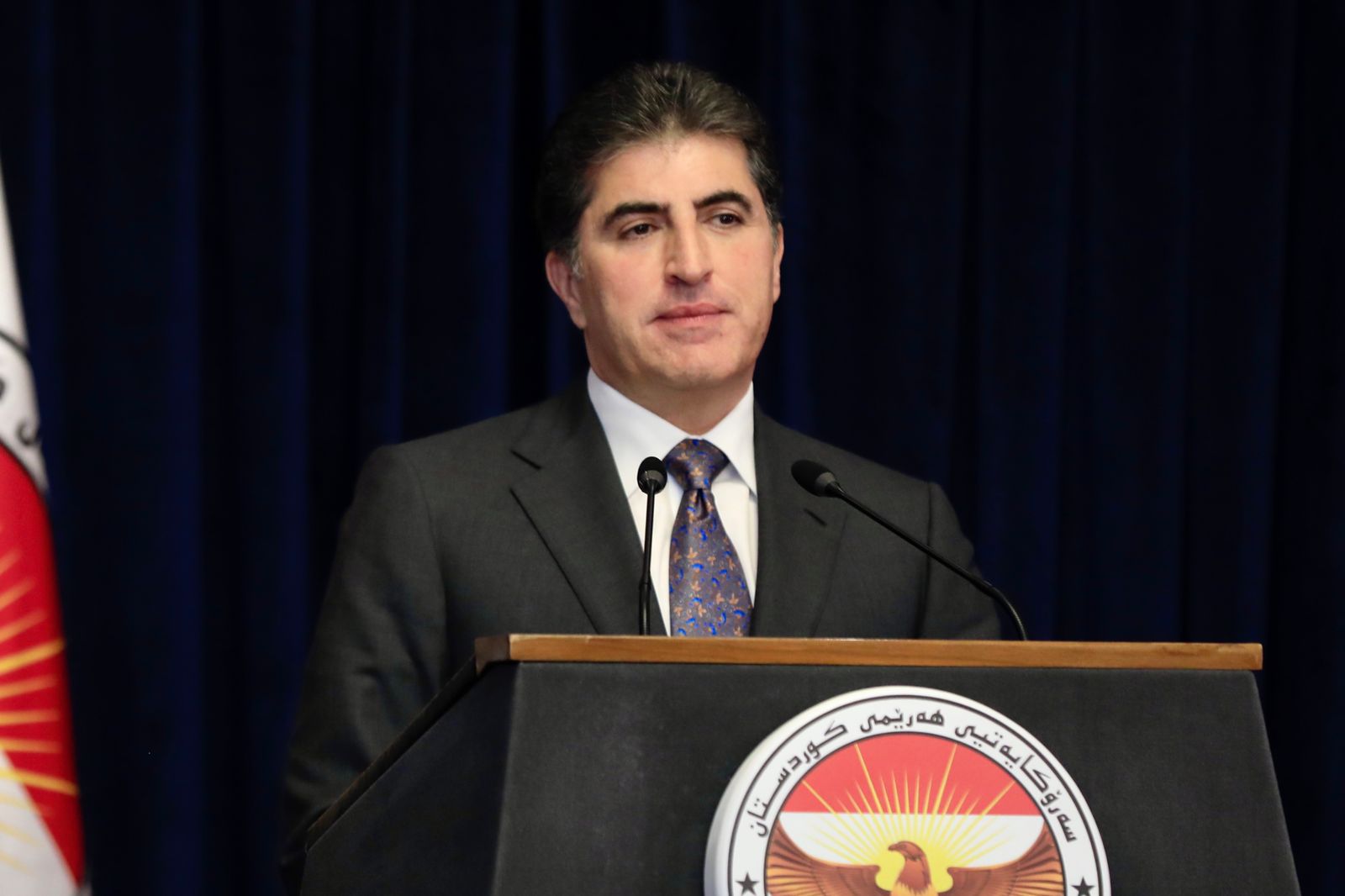
2021-12-08T21:25:46.000000Z
Erbil, Kurdistan Region, December 8, 2021
Kurdistan Region President Nechirvan Barzani delivered a speech at the sworn-in ceremony of Judge Abdul-Jabbar Aziz Hassan, the head of the Cassation Court and the Judicial Council of the Kurdistan Region. The ceremony was held at the office of the Kurdistan Region Presidency.
In his speech, President Nechirvan Barzani shed light on the status of the judiciary, and the problems and challenges ahead of the legal system. The President reaffirmed the significance of judicial independence and the rule of law as the foundations of the democratic system and the advanced society.
The President reiterated that the judiciary must be completely free from political influence and have the ability to protect itself. Other authorities and all sides must respect the independence of the legal system and the rule of law, with the aim that citizens trust in the judiciary and the law.
The following is a readout of the speech delivered by the President today:
Good afternoon,
Mr. President and esteemed Members of the Kurdistan Region Judicial Council,
Esteemed Judges,
Ladies and Gentlemen,
Good afternoon and welcome.
First of all, I would like to congratulate Judge Abdul-Jabbar Aziz Hassan on taking the oath of office as the head of the Cassation Court of the Kurdistan Region and head of the Judicial Council of the Kurdistan Region. I wish him and all of you success.
Ladies and gentlemen,
The main basis of any democratic system and all advanced societies in which citizens are confident and have hope for the future, is the separation of the three powers of Legislation, Executive, and Judiciary. Each of these powers are independent and have different responsibilities in an ideal society.
Our objective is to separate these powers in the Kurdistan Region and rearrange their interrelations in way that none will influence the others as they refrain from intervening in the internal affairs of one anther. This, for us, represents the cardinal step towards institutionalizing governance in the Kurdistan Region and establishing democracy, along with a civil and advanced society.
Independence of the judiciary has two dimensions:
First, the independence of the judges.
Second, the independence of the judicial institution.
The independence of the judges: that is, the judge must be impartial and free to deliver verdicts; to realize this, the judges must enjoy financial independence and security. They must be protected from all undue influences, and be protected from all kinds of violence, threats, direct and indirect harassments by either the government, political figures, powerful people, relatives or by any other side with interest to influence their decisions.
The independence of the judicial institution: that is, the judicial council as an institution must be independent and free from control of any institutions of the government or the parliament. The judicial institution should, under no circumstances, be under the influence of political authority, nor should it become a means for politics. It must maintain institutional relation with the executive and legislative powers.
It is the duty of the judicial council to protect the judges from undue influences. This will be realized when it assures that the decisions of the judges are impartial, right and solely on the basis of the law. Citizens must rest assured that the court will address their cases lawfully and in accordance with the rules of justice.
Citizens must entertain no doubts about the fact that they have been heard with regards to their cases and complaints. Citizens must rest assured that the judges are under no external pressure and only their conscience and abidance by the law will form their decisions. Citizens abide by the law and the judiciary, when the law and the justice system are free and independent beyond any doubts.
But, ladies and gentlemen,
- Is this the reality of the judicial system in the Kurdistan Region?
- Is it independent and under no influence of politics and authorities of any kind?
- Do citizens fully trust in the judicial authority?
- Have the judicial authority, the judicial council and the esteemed judges made use of their lawful authorities to protect their independence; an independence which is sanctioned by the law?
No doubt, the answers to these questions invite different arguments and point of views. Undoubtedly, as in all other fields, the judicial authority has been and still is used as a means for political and media propagation and feud in the Kurdistan Region. There are attempts to attack its decency, independence and professionalism, in order to weaken the trust of the citizens in the judicial authority and the courts.
But the answer to this is found in the rightful justice and a court that is independent and lawful. Despite any critique, the judicial authority is one of the main pillars of the Kurdistan Region as an entity. It has high position and profound presence and serves with integrity. It is and has been playing a considerable role in the establishment of the lawful foundation of the Kurdistan Region.
Despite that, ladies and gentlemen,
As in all other fields, we do not assert that the judicial authority in the Kurdistan Region is complete or free from problems. There are certain truths that we need to acknowledge with courage. The judicial authority faces serious problems and challenges, which need to be resolved. More or less, there are attempts to interfere, to control and to exert political influence on certain parts of the judicial authority, which must be prevented.
The question is, how do we face the challenges? How to address the problems and prevent all kinds of interferences, controls and influences upon the judicial authority?
In my view, first and foremost, the judicial authority needs to protect its own authority, which is sanctioned by the law. It must have serious will to face its challenges. It needs to be protective of its powers, without fear and with courage it must defend its authorities, which are sanctioned by the law. It must not allow or accept interference, under any circumstances or pretexts, from any authorities, persons, forces or sides. It must bow to no threat, pressure, influence or unlawful requests by any position or place.
Undoubtedly, both the executive and the legislative branches, all political, party, military, administrative and financial authorities must respect the judicial authority and refrain from interfering in the affairs of the legal system.
The judicial authority has a large responsibility on its shoulders. The judicial council and the esteemed judges must recognize their responsibilities. They must accept this heavy duty and act in good conscience before God and before the people of Kurdistan.
If the judges are not willing to protect and defend the independence of their authorities, if they do not reject control, influence, pressure and threats, and if they do not confront them courageously, then they will be accountable before God and people.
The judiciary is the cornerstone of trust, belief and security of the citizens. A strong and powerful justice is the main protector of society and the wellbeing of a political, governmental, administrative and financial system in any country of the world. There are direct relations between economic development and preserving the assets with the prevalence of the rule of law in all countries.
The absence of the rule of law will weaken investments, which will, in turn, weaken the economy. But the rule of law will encourage investments, which will directly support economic development in any country. This is especially true of countries like Kurdistan Region, which is in a transitory stage towards democratic and economic development. Therefore, the rule of law in the Kurdistan Region is needed twice: first, so it helps us develop the economy in the Kurdistan Region; and second, so that it assists us to secure the democratic principles and becoming an advanced society.
Ladies and gentlemen,
Our objective is to found a democratic system, which treats citizens gently, but a democratic system can emerge only when the rule of law is in place. The rule of law is in place only when the three branches of the legislative, the executive and the judiciary are separated completely. That is, without introducing the judicial authority and its independence and empowerment, it is impossible for a democratic system to emerge.
Culture operates as the base for the rule of law. With regard to culture, it is education that plays a vital role in promoting the rule of law. Through education and learning it is possible to make culture a powerful support and an ingredient of the rule of the law.
In my view, this is possible in two ways:
First: encouraging the citizens to show respect for the foundations of the rule of law in their daily lives.
Second: citizens must be made aware of the great benefits of the rule of law and be trained to abide by it.
Your expectations are that citizens abide by the law, whether they approve of it or not. Always remember that citizens can respect the law only when it is above politics and when it can confront authority. It is only then that citizens trust that the law can protect them. Therefore, the expectation of the citizens of you is that the law is enforced justly upon all and everyone.
I hope you recognize the expectations that this oath of office will generate. I hope you realize the expectations in order to earn the trust of the citizens. The judicial authority must be independent in assessing the evidence, in practicing the law and in delivering verdicts on cases without paying attention to whom it will please or not.
The judge must make sure that the rule of law is in place and decide on the cases according to the principles of justice and impartiality. It is only then that the citizens can trust the decency of the process and the rightfulness of the outcomes. Thus, what are the expectations that we and all the people of Kurdistan have of the judges? We expect them to be independent.
Ladies and gentlemen,
The Judicial authority must work so that the courts and the judges earn the trust of citizens more profoundly. If there is no trust in the courts, crimes will increase, revenges will occur more often, and social harmony and peace will be in danger. Courts and judges must take distance from political feuds and refrain from taking sides.
No one should be above the law. All must be equal before the law. The judge must perform its duties with outmost compassion, impartially and decently. Great importance must be attached to the courts which deal with citizens on a daily bases, since the bases of governance are there.
The principles of human rights and international norms must be realized in the judiciary system and everyone must have the right to defend itself before a court of law. Importance must be attached to supporting experienced and skilled judges. Opportunities for women judges must increase and I am delighted that in this ceremony some of them have been invited and are present here. I sincerely welcome them. Efforts must be exerted to reform the judicial authority. This will make the first step towards reform in other areas.
Judges realize the shortcomings of the laws as they practice them, therefore it is imperative that they participate in reassessing the penal codes in the Kurdistan Region and in the reform process of the judiciary. I support the independence and impartiality of the judges with all my powers in order to realize justice and the rule of law in our country. Government institutions and all other parties must be supportive of the independence of the courts and support the enforcement of the court decisions.
The Kurdistan Region Judicial Council must cooperate and maintain strong relations with Iraq’s Federal Judicial Council and the Federal Court. It must employ the existing cutting edge technology in its judiciary work. It must attach importance to judiciary institutions and the supervision. These actions will lead us from this stage towards next stages and help us take stronger steps for the Kurdistan Region.
In conclusion I reiterate, the judiciary is one of our most important pillars. If the judicial authority is strong, the country is safeguarded; it will also safeguard society and the individual with trust and confidence and commitment. And then the doors of opportunities and development will open and citizens will look to the future with optimism.
I wish you all the success.
Welcome all.
Thank you.
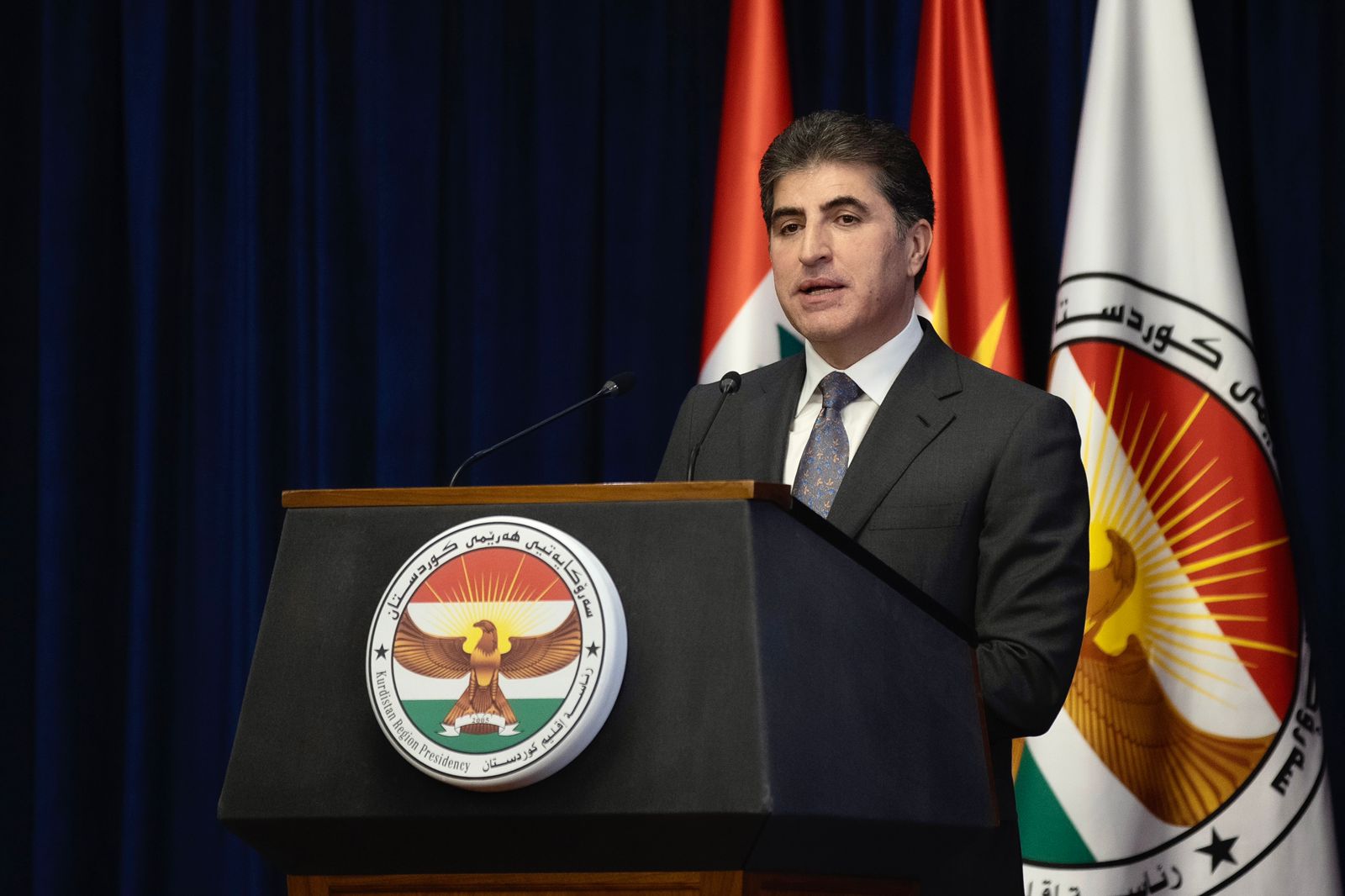
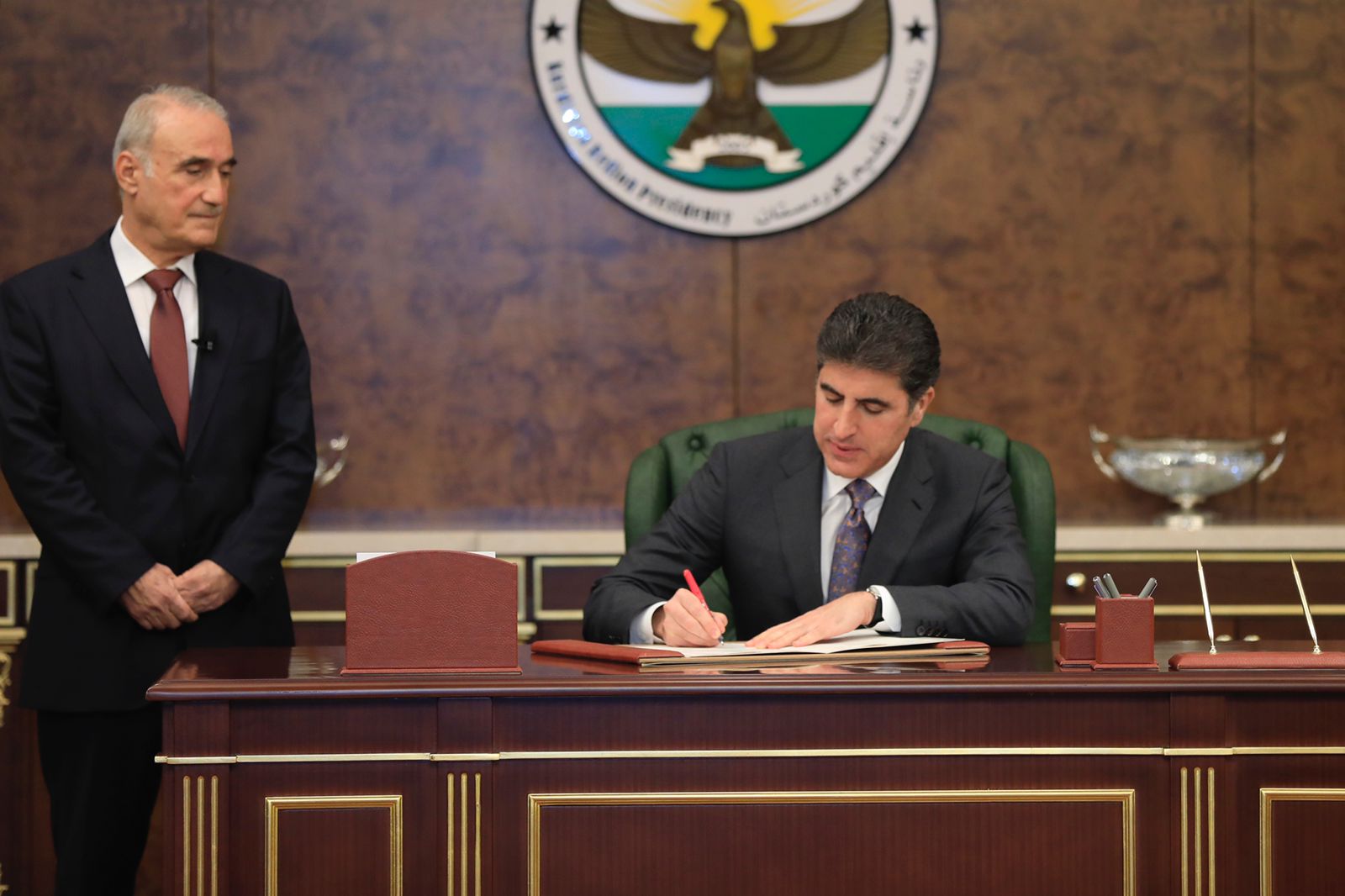
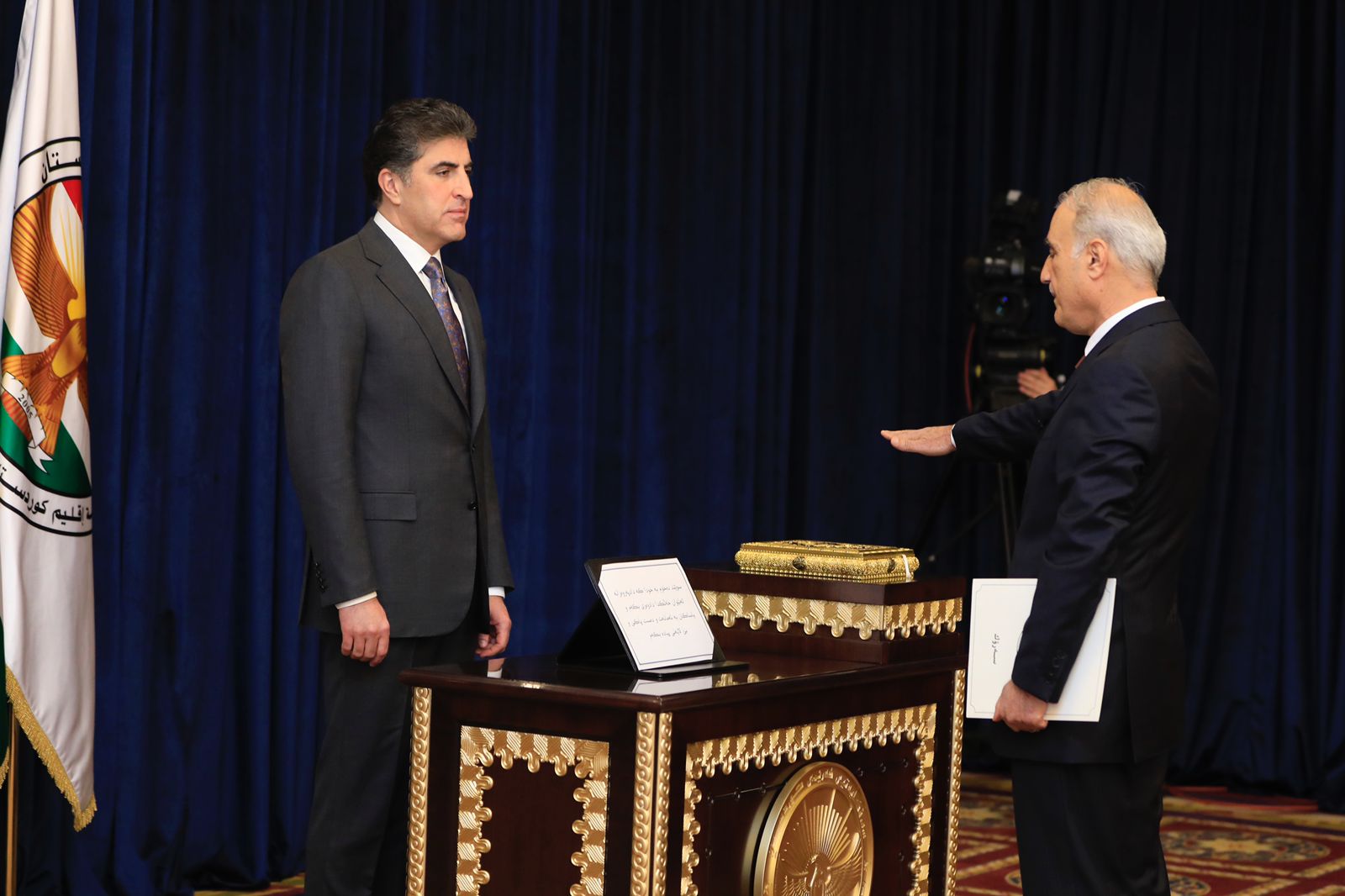
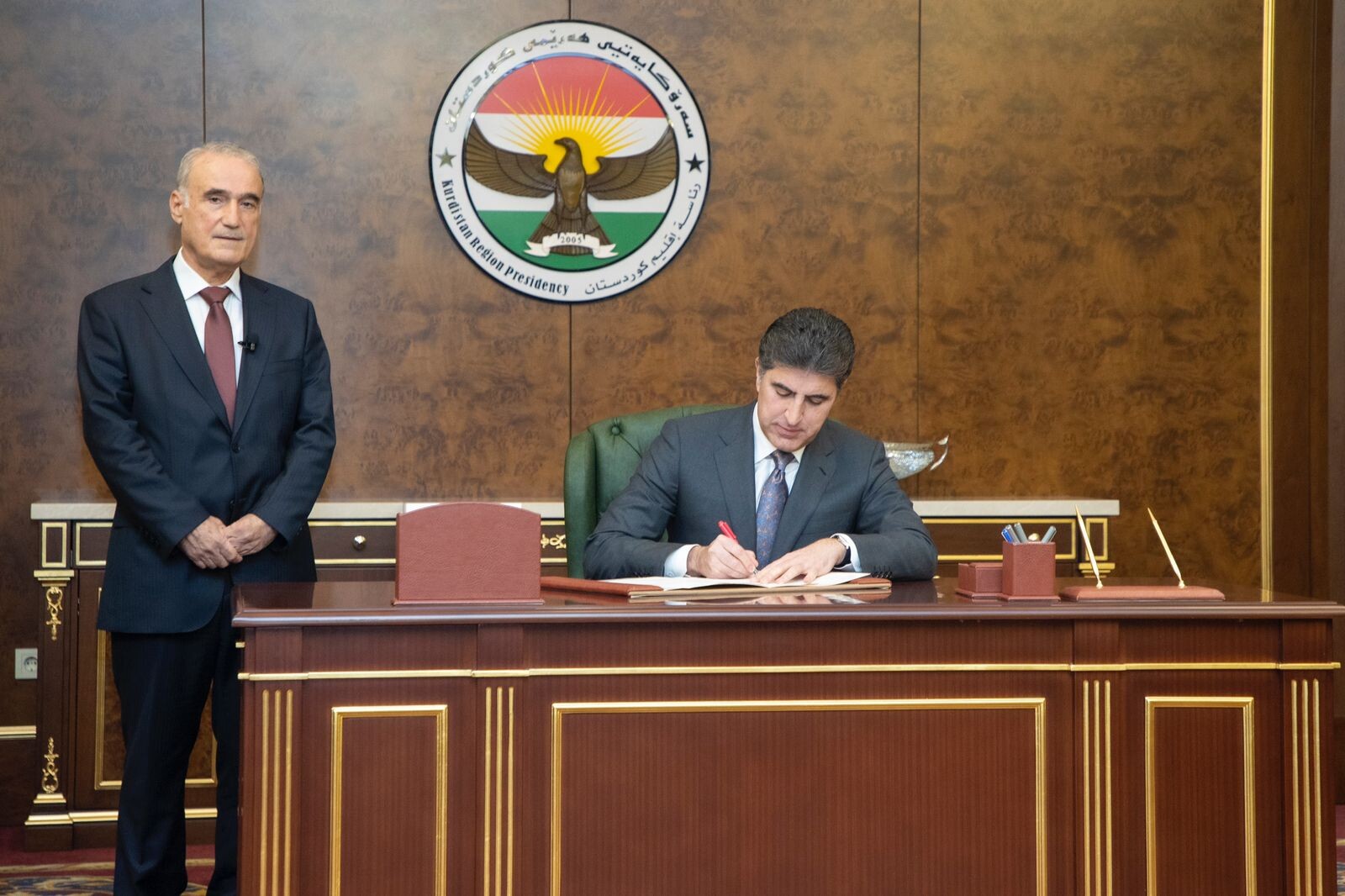
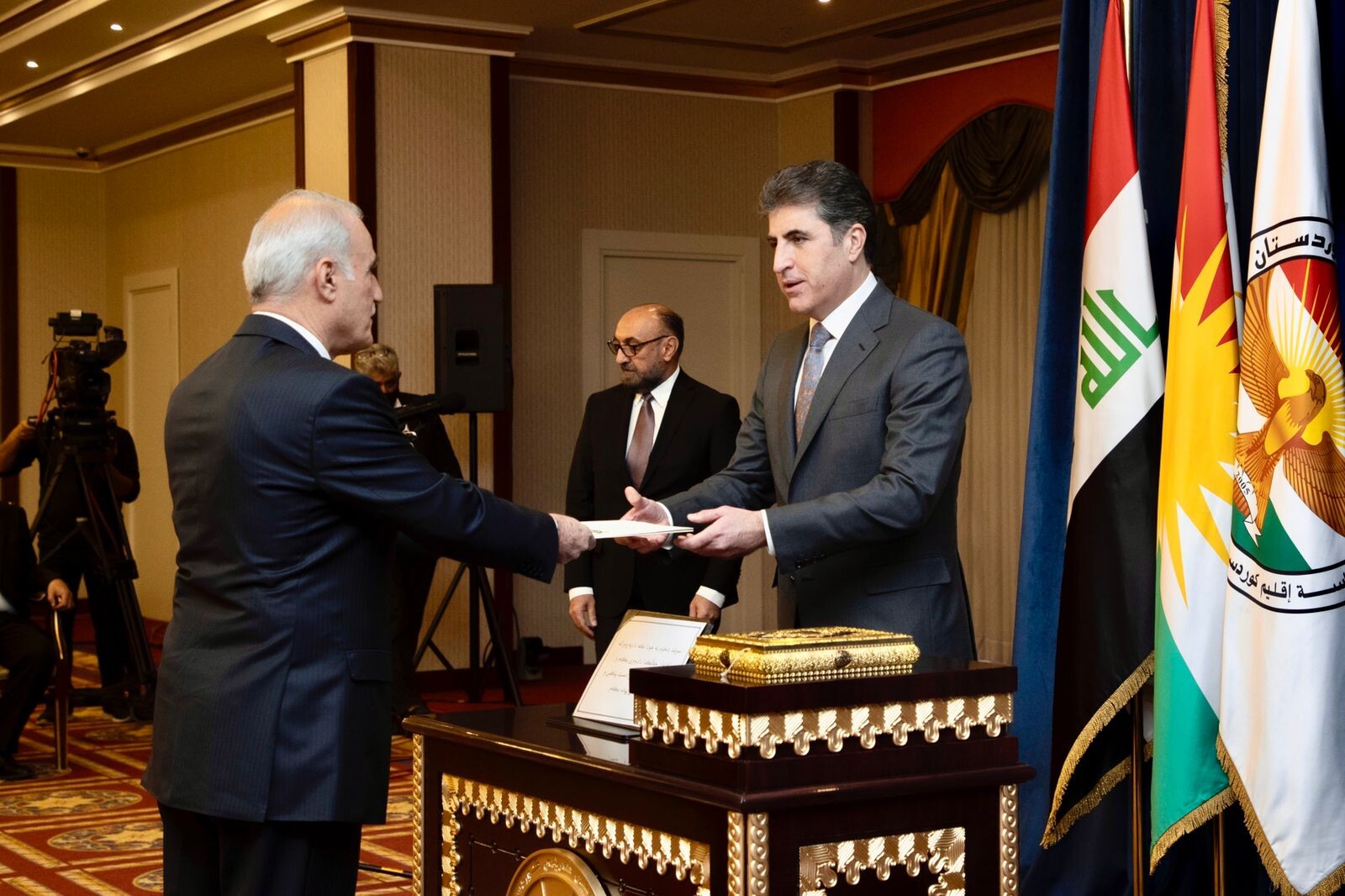
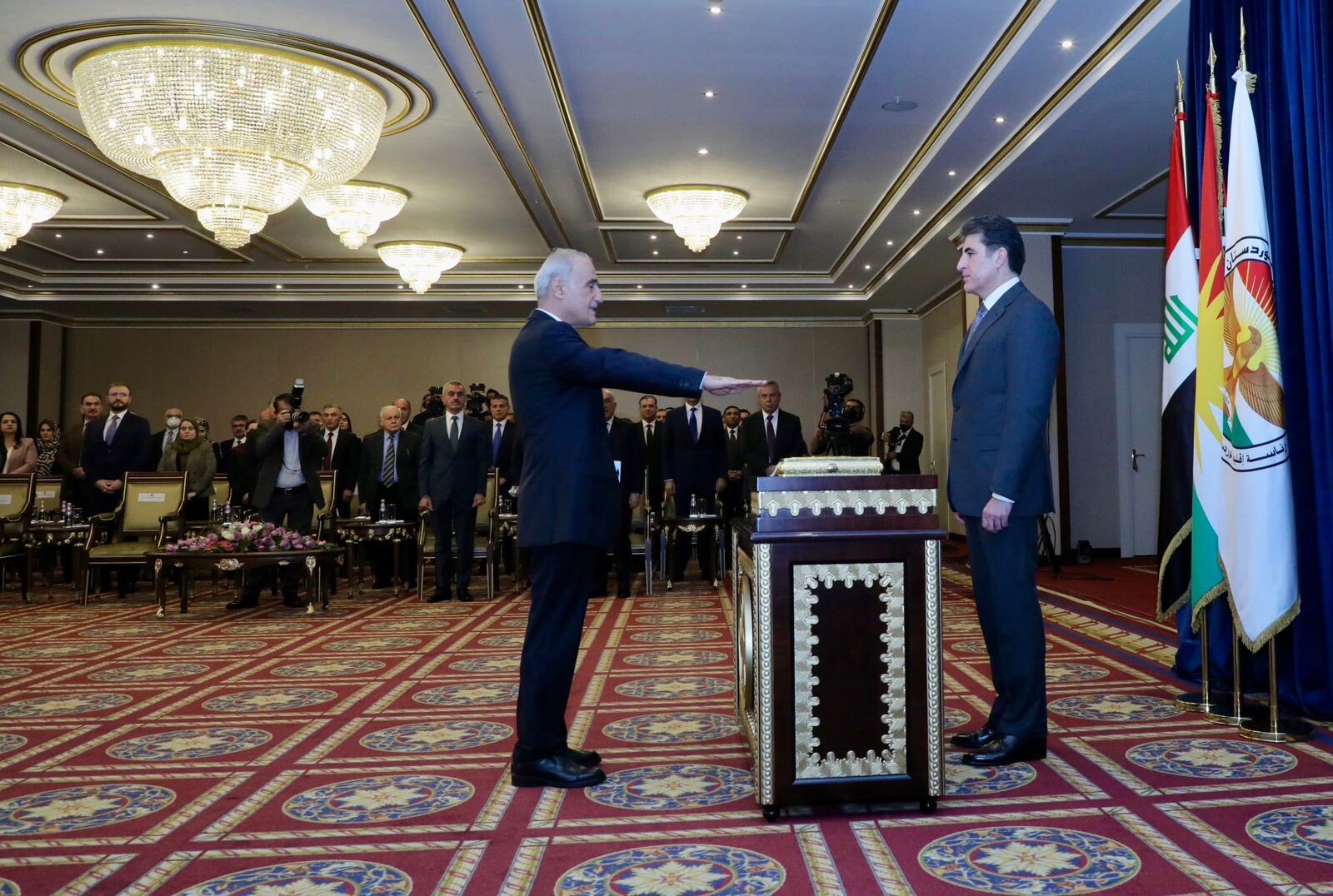
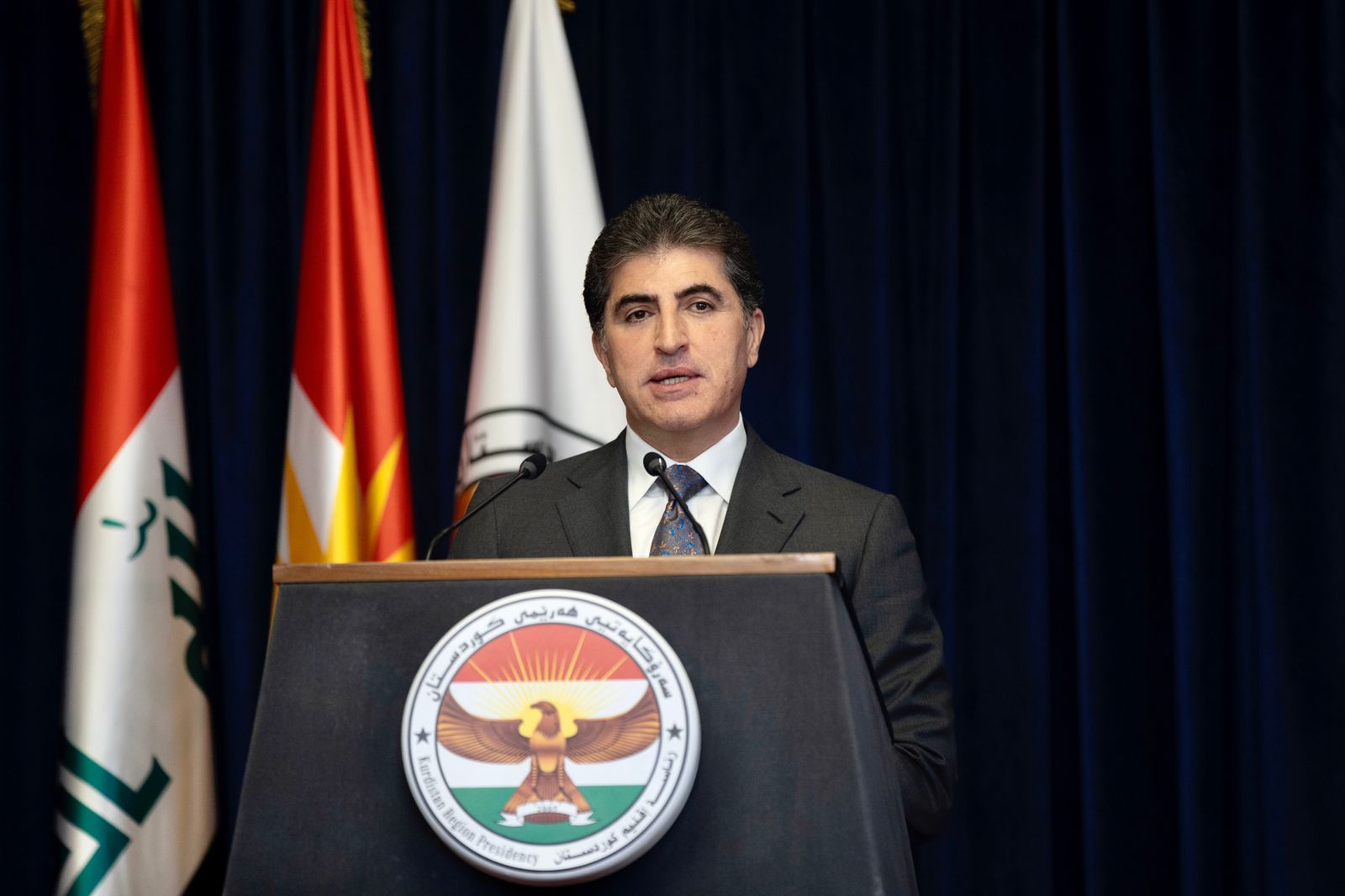
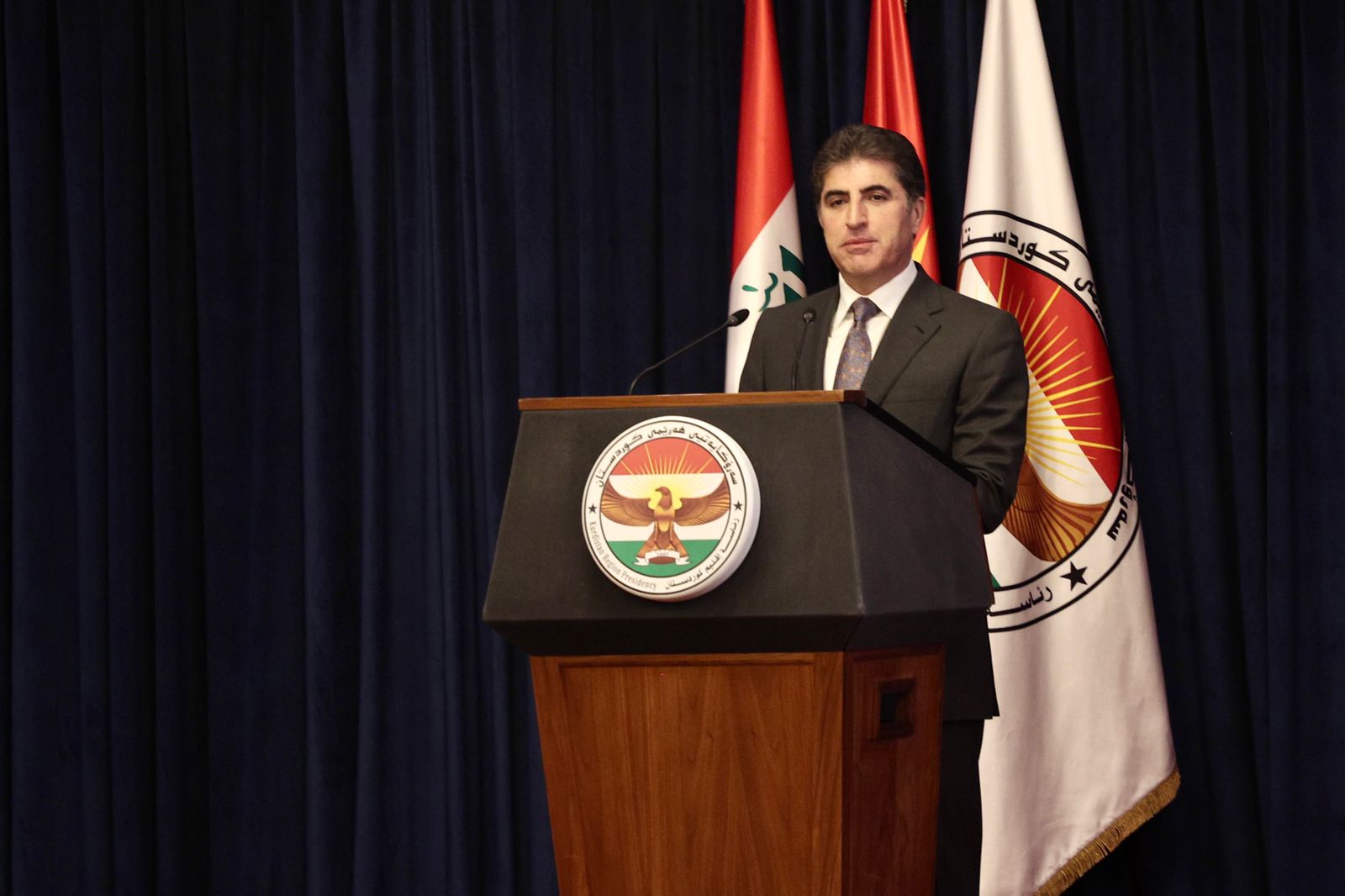
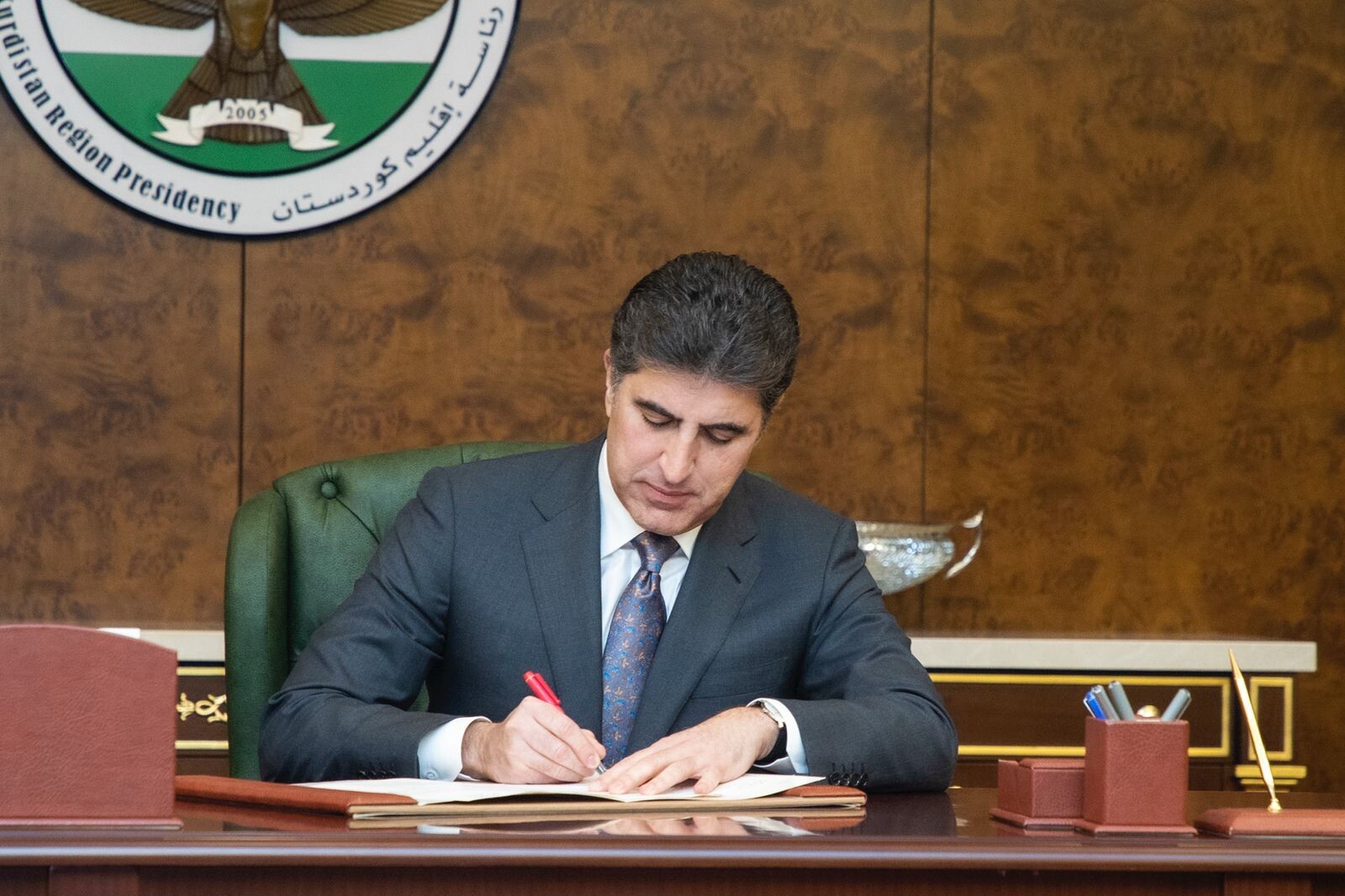
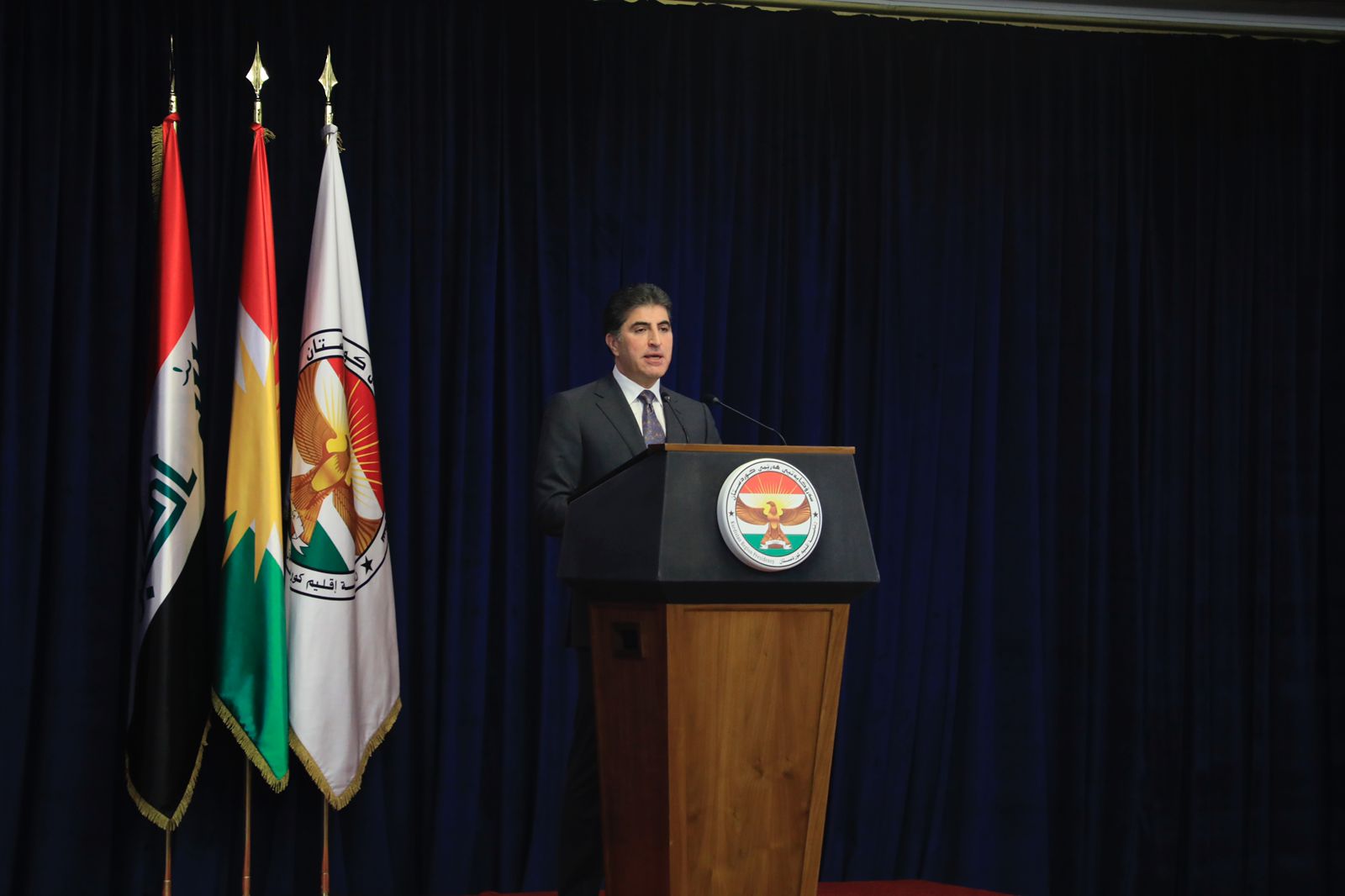
Kurdistan Region President Nechirvan Barzani delivered a speech at the sworn-in ceremony of Judge Abdul-Jabbar Aziz Hassan, the head of the Cassation Court and the Judicial Council of the Kurdistan Region. The ceremony was held at the office of the Kurdistan Region Presidency.
In his speech, President Nechirvan Barzani shed light on the status of the judiciary, and the problems and challenges ahead of the legal system. The President reaffirmed the significance of judicial independence and the rule of law as the foundations of the democratic system and the advanced society.
The President reiterated that the judiciary must be completely free from political influence and have the ability to protect itself. Other authorities and all sides must respect the independence of the legal system and the rule of law, with the aim that citizens trust in the judiciary and the law.
The following is a readout of the speech delivered by the President today:
Good afternoon,
Mr. President and esteemed Members of the Kurdistan Region Judicial Council,
Esteemed Judges,
Ladies and Gentlemen,
Good afternoon and welcome.
First of all, I would like to congratulate Judge Abdul-Jabbar Aziz Hassan on taking the oath of office as the head of the Cassation Court of the Kurdistan Region and head of the Judicial Council of the Kurdistan Region. I wish him and all of you success.
Ladies and gentlemen,
The main basis of any democratic system and all advanced societies in which citizens are confident and have hope for the future, is the separation of the three powers of Legislation, Executive, and Judiciary. Each of these powers are independent and have different responsibilities in an ideal society.
Our objective is to separate these powers in the Kurdistan Region and rearrange their interrelations in way that none will influence the others as they refrain from intervening in the internal affairs of one anther. This, for us, represents the cardinal step towards institutionalizing governance in the Kurdistan Region and establishing democracy, along with a civil and advanced society.
Independence of the judiciary has two dimensions:
First, the independence of the judges.
Second, the independence of the judicial institution.
The independence of the judges: that is, the judge must be impartial and free to deliver verdicts; to realize this, the judges must enjoy financial independence and security. They must be protected from all undue influences, and be protected from all kinds of violence, threats, direct and indirect harassments by either the government, political figures, powerful people, relatives or by any other side with interest to influence their decisions.
The independence of the judicial institution: that is, the judicial council as an institution must be independent and free from control of any institutions of the government or the parliament. The judicial institution should, under no circumstances, be under the influence of political authority, nor should it become a means for politics. It must maintain institutional relation with the executive and legislative powers.
It is the duty of the judicial council to protect the judges from undue influences. This will be realized when it assures that the decisions of the judges are impartial, right and solely on the basis of the law. Citizens must rest assured that the court will address their cases lawfully and in accordance with the rules of justice.
Citizens must entertain no doubts about the fact that they have been heard with regards to their cases and complaints. Citizens must rest assured that the judges are under no external pressure and only their conscience and abidance by the law will form their decisions. Citizens abide by the law and the judiciary, when the law and the justice system are free and independent beyond any doubts.
But, ladies and gentlemen,
- Is this the reality of the judicial system in the Kurdistan Region?
- Is it independent and under no influence of politics and authorities of any kind?
- Do citizens fully trust in the judicial authority?
- Have the judicial authority, the judicial council and the esteemed judges made use of their lawful authorities to protect their independence; an independence which is sanctioned by the law?
No doubt, the answers to these questions invite different arguments and point of views. Undoubtedly, as in all other fields, the judicial authority has been and still is used as a means for political and media propagation and feud in the Kurdistan Region. There are attempts to attack its decency, independence and professionalism, in order to weaken the trust of the citizens in the judicial authority and the courts.
But the answer to this is found in the rightful justice and a court that is independent and lawful. Despite any critique, the judicial authority is one of the main pillars of the Kurdistan Region as an entity. It has high position and profound presence and serves with integrity. It is and has been playing a considerable role in the establishment of the lawful foundation of the Kurdistan Region.
Despite that, ladies and gentlemen,
As in all other fields, we do not assert that the judicial authority in the Kurdistan Region is complete or free from problems. There are certain truths that we need to acknowledge with courage. The judicial authority faces serious problems and challenges, which need to be resolved. More or less, there are attempts to interfere, to control and to exert political influence on certain parts of the judicial authority, which must be prevented.
The question is, how do we face the challenges? How to address the problems and prevent all kinds of interferences, controls and influences upon the judicial authority?
In my view, first and foremost, the judicial authority needs to protect its own authority, which is sanctioned by the law. It must have serious will to face its challenges. It needs to be protective of its powers, without fear and with courage it must defend its authorities, which are sanctioned by the law. It must not allow or accept interference, under any circumstances or pretexts, from any authorities, persons, forces or sides. It must bow to no threat, pressure, influence or unlawful requests by any position or place.
Undoubtedly, both the executive and the legislative branches, all political, party, military, administrative and financial authorities must respect the judicial authority and refrain from interfering in the affairs of the legal system.
The judicial authority has a large responsibility on its shoulders. The judicial council and the esteemed judges must recognize their responsibilities. They must accept this heavy duty and act in good conscience before God and before the people of Kurdistan.
If the judges are not willing to protect and defend the independence of their authorities, if they do not reject control, influence, pressure and threats, and if they do not confront them courageously, then they will be accountable before God and people.
The judiciary is the cornerstone of trust, belief and security of the citizens. A strong and powerful justice is the main protector of society and the wellbeing of a political, governmental, administrative and financial system in any country of the world. There are direct relations between economic development and preserving the assets with the prevalence of the rule of law in all countries.
The absence of the rule of law will weaken investments, which will, in turn, weaken the economy. But the rule of law will encourage investments, which will directly support economic development in any country. This is especially true of countries like Kurdistan Region, which is in a transitory stage towards democratic and economic development. Therefore, the rule of law in the Kurdistan Region is needed twice: first, so it helps us develop the economy in the Kurdistan Region; and second, so that it assists us to secure the democratic principles and becoming an advanced society.
Ladies and gentlemen,
Our objective is to found a democratic system, which treats citizens gently, but a democratic system can emerge only when the rule of law is in place. The rule of law is in place only when the three branches of the legislative, the executive and the judiciary are separated completely. That is, without introducing the judicial authority and its independence and empowerment, it is impossible for a democratic system to emerge.
Culture operates as the base for the rule of law. With regard to culture, it is education that plays a vital role in promoting the rule of law. Through education and learning it is possible to make culture a powerful support and an ingredient of the rule of the law.
In my view, this is possible in two ways:
First: encouraging the citizens to show respect for the foundations of the rule of law in their daily lives.
Second: citizens must be made aware of the great benefits of the rule of law and be trained to abide by it.
Your expectations are that citizens abide by the law, whether they approve of it or not. Always remember that citizens can respect the law only when it is above politics and when it can confront authority. It is only then that citizens trust that the law can protect them. Therefore, the expectation of the citizens of you is that the law is enforced justly upon all and everyone.
I hope you recognize the expectations that this oath of office will generate. I hope you realize the expectations in order to earn the trust of the citizens. The judicial authority must be independent in assessing the evidence, in practicing the law and in delivering verdicts on cases without paying attention to whom it will please or not.
The judge must make sure that the rule of law is in place and decide on the cases according to the principles of justice and impartiality. It is only then that the citizens can trust the decency of the process and the rightfulness of the outcomes. Thus, what are the expectations that we and all the people of Kurdistan have of the judges? We expect them to be independent.
Ladies and gentlemen,
The Judicial authority must work so that the courts and the judges earn the trust of citizens more profoundly. If there is no trust in the courts, crimes will increase, revenges will occur more often, and social harmony and peace will be in danger. Courts and judges must take distance from political feuds and refrain from taking sides.
No one should be above the law. All must be equal before the law. The judge must perform its duties with outmost compassion, impartially and decently. Great importance must be attached to the courts which deal with citizens on a daily bases, since the bases of governance are there.
The principles of human rights and international norms must be realized in the judiciary system and everyone must have the right to defend itself before a court of law. Importance must be attached to supporting experienced and skilled judges. Opportunities for women judges must increase and I am delighted that in this ceremony some of them have been invited and are present here. I sincerely welcome them. Efforts must be exerted to reform the judicial authority. This will make the first step towards reform in other areas.
Judges realize the shortcomings of the laws as they practice them, therefore it is imperative that they participate in reassessing the penal codes in the Kurdistan Region and in the reform process of the judiciary. I support the independence and impartiality of the judges with all my powers in order to realize justice and the rule of law in our country. Government institutions and all other parties must be supportive of the independence of the courts and support the enforcement of the court decisions.
The Kurdistan Region Judicial Council must cooperate and maintain strong relations with Iraq’s Federal Judicial Council and the Federal Court. It must employ the existing cutting edge technology in its judiciary work. It must attach importance to judiciary institutions and the supervision. These actions will lead us from this stage towards next stages and help us take stronger steps for the Kurdistan Region.
In conclusion I reiterate, the judiciary is one of our most important pillars. If the judicial authority is strong, the country is safeguarded; it will also safeguard society and the individual with trust and confidence and commitment. And then the doors of opportunities and development will open and citizens will look to the future with optimism.
I wish you all the success.
Welcome all.
Thank you.















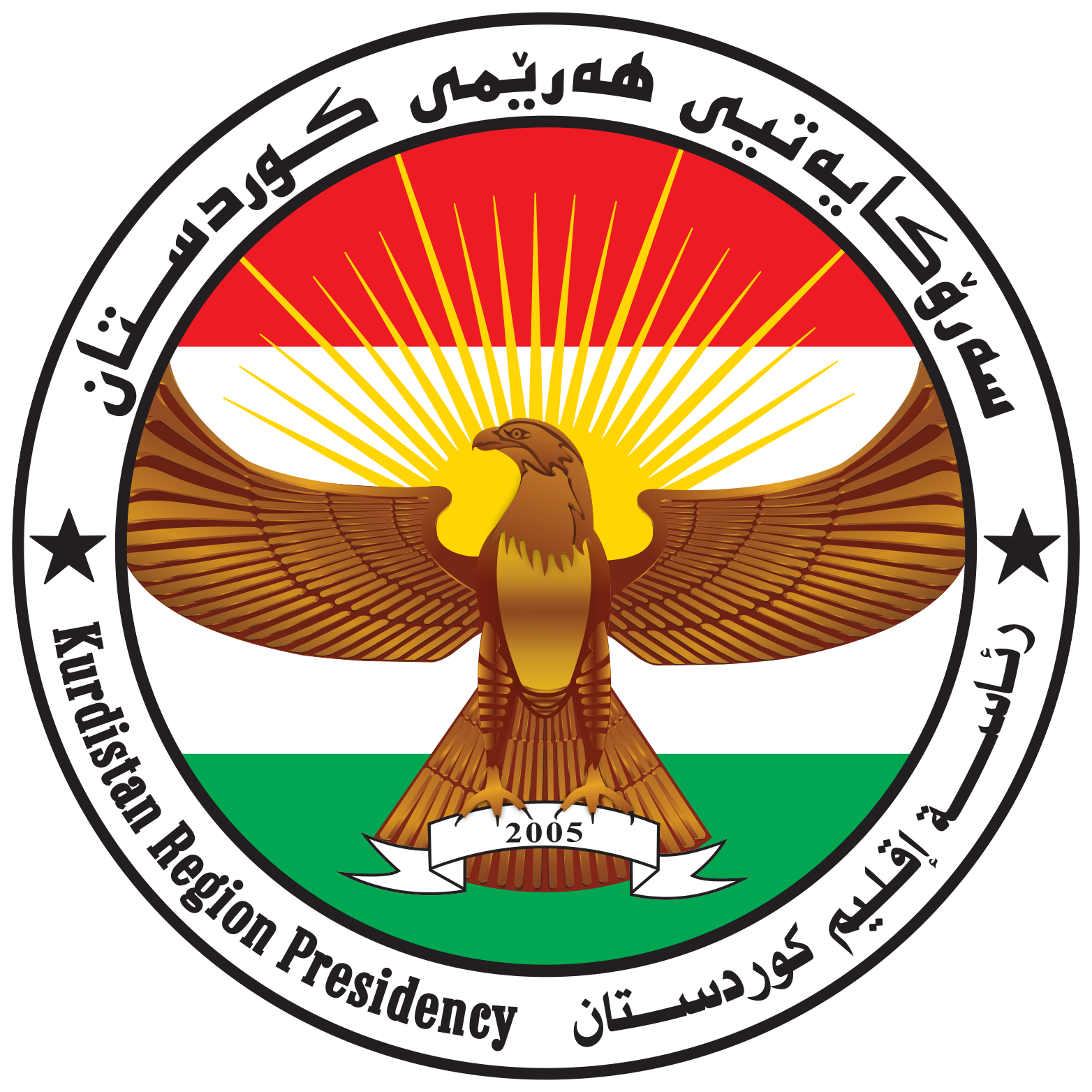

 پەرلەمانی کوردستان
پەرلەمانی کوردستان
